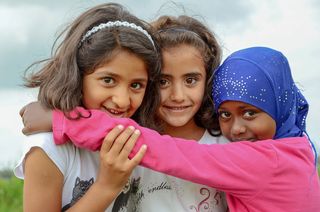Health
Therapeutic Services for People from Refugee Backgrounds
Prevalence of mental health difficulties and effectiveness of services
Posted March 15, 2019
Current reports and academic research consistently portrays people from refugee backgrounds as vulnerable and in need of Western-based mental health services, but the reality is more complex than this. We need a more nuanced approach to service provision that involves collaboration with refugee communities to identify needs, instead of an ongoing and often singular focus on addressing individualized trauma.
“The current figures for people forcibly displaced by persecution and conflict are simply staggering. In 2017 over 68 million people had been forcibly displaced with the largest contributors being Syria, Afghanistan, and South Sudan.” (Community-based mental health and wellbeing support for refugees, 2018.)

Mainstream media suggests large refugee flows from South America to North America at this time. However, the figures presented are just a fraction of the flow of people in more impoverished countries who are host to very large numbers of displaced people including Turkey, Lebanon, and countries in Africa and Asia.
A number of countries participate in the UNHCR resettlement program with Australia being one of the top five countries offering permanent resettlement. Australia has a current humanitarian intake of over 13,000 people annually, and that figure is due to increase significantly. At the same time, there is continuing conflict in addressing the resettlement needs of people who enter Australia through a formal humanitarian entry program, and the arrival of asylum seekers – particularly those who have arrived by boat. We need high-quality research to explore the degree to which support services support mental health and wellbeing for people from refugee backgrounds, resettled in high-income countries. Such services may be provided at various levels from the individual, family, community, and larger contextual -based services.
High-income countries seek to support both the material and psychosocial needs of people arriving from refugee backgrounds. A recent Sax Institute Report explored the effectiveness of community-based psychosocial programs oriented towards the needs of people from both refugee and asylum seeker backgrounds. The report’s essential question pertained to the effectiveness of such programs in improving mental health and wellbeing. The review identified just 41 papers published between 2010 and 2018 addressing the mental health issues of this cohort. Interventions were categorized in terms of trauma-informed psychotherapy programs delivered with a group component: community-based psychoeducation or health programs; physical activity or sport-based programs; and peer support and/or mentoring programs.
In assessing these programs, the review identified significant gaps in the evidence with very few high-quality studies able to address the key question as to the effectiveness of the programs. Difficulties with the evidence included: a lack of quality evaluations; limited outcome measures; limited description of interventions; and lack of consideration of the sub-groups within targeted populations.
The review has many strengths in terms of recommendations, but also some significant limitations. A potential issue of the review relates to the perpetuation of a trauma-focused narrative surrounding the lives of people from refugee backgrounds. It goes without saying that many people from refugee backgrounds have been exposed to unspeakable events and experiences. Yet, our own research points to the fact that the majority of people who have been exposed to such difficulties demonstrate resilience and are high-functioning during their resettlement. For example, in a community sample of people from Sudan, we reported on the prevalence of mental health issues in this population. It was noteworthy that less than five percent of study participants met the criteria for post-traumatic stress disorder, with 25 percent reporting clinically high levels of psychological distress. That is, over 70 percent of participants did not evidence distress at the time of assessment. Social support from the migrants’ communities was important in predicting these positive mental health outcomes. Surprisingly, the major stressors acting on individuals emerged as post-migration difficulties (such as worry about family not in Australia; difficulties with employment; and difficulties adjusting to the cultural life in Australia).
In a large review study involving 7,000 people from refugee backgrounds, it was reported that 9% of people suffered from Post-Traumatic Stress Disorder. Surveys of children from refugee backgrounds revealed that 11% had presentations consistent with post-traumatic stress disorder. Comparative figures from the 1997 National Survey of Mental Health and Wellbeing reveals that the overall prevalence of post-traumatic stress disorder in an adult general population was 1.5% but increased to 3.8% of women and 2.0% of men who reported having experienced trauma. The purpose of these figures is to reveal that humans are resilient, and dealing with adversity may contribute to, but does not necessarily result in trauma symptoms.
In our research with youth from refugee backgrounds, we also reported on difficulties experienced by this group. In our sample of 79 youth aged between 11 and 18 years, 14 percent were assessed as exhibiting anxiety symptoms, and 18 percent exhibited depressive symptoms. That is, the overwhelming majority of children did not evidence mental health difficulties.

Such research is at odds with common representations of, and responses to, the needs of people from refugee backgrounds. We agree with the recent Sax Institute Report that service providers would benefit from closer collaboration with researchers and engage in high-quality research that leads to improved community wellbeing. Such research may involve local communities in determining their needs and identifying those issues which emerge as most salient in fostering social inclusion and connection.
Current world events are highly significant in terms of forced displacement and the human consequences of such displacement. The impacts are of course profound, but it is also important to consider the degree to which subgroups of people are resilient and thrive in new communities. This is not to detract from the suffering associated with migration, but to also advocate for strengths-based approaches aimed at fostering wellbeing and social inclusivity in the context of mass migration.
References
Community-based mental health and wellbeing support for refugees; Sax Institute; https://www.saxinstitute.org.au/publications/community-based-mental-hea…




